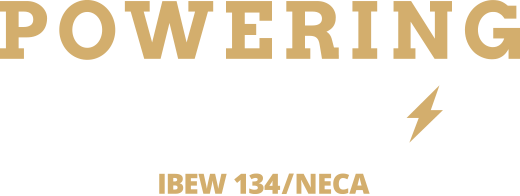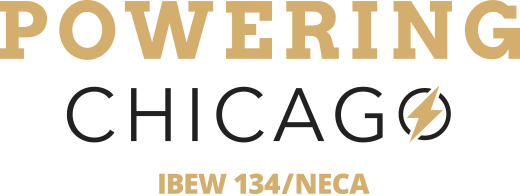Powering Chicago Joins Illinois Building Trades in Springfield to Ensure Proper Safety on High-Hazard Job Sites
- Posted: February 26, 2020
- better communities, Maurice King, Priscilla Munoz; Mesay Tefera, Thomas Cooks
This week, members of IBEW Local 134 joined members from IBEW Local 176 and other Illinois building trades in Springfield to lobby legislators on the benefits of the Illinois Hazardous Materials Workforce Training Act (SB 1407), which would require work done on high-hazard job sites to be performed by contractors and sub-contractors who hire from Department of Labor-approved apprenticeship programs.
There are currently 52 high-hazard active job sites in Illinois with much of the work being performed in the region where IBEW Local 176 operates, which encompasses Joliet and the surrounding area. These job sites typically consist of ethanol refineries or other power plants where total and complete safety is paramount. Powering Chicago contractors and electricians support IBEW Local 176 and other building trades’ efforts to increase safety on these job sites.
“With hazardous materials comes more introduction to injuries and we want to make sure that individuals who work in those situations are trained,” said Elbert Walters, an IBEW Local 134 Business Agent who attended the week’s events in Springfield. “We do not have the same level of refinery and distillery work that our collar county IBEW’s do, but we want to show solidarity because we know that hazardous exposure doesn’t always just contain itself to one specific area.”
Walters was joined in Springfield by IBEW Local 134 Vice President, Maurice King; IBEW Local 134 journeywoman electrician, Priscilla Munoz; IBEW Local 134 fourth-year apprentice, Mesay Tefera; and IBEW Local 134 third-year apprentice, Thomas Cooks. Each was there to share their experience working for IBEW Local 134 and the training they’ve received.
Department of Labor-approved apprenticeship programs, like the one Powering Chicago electricians go through, teach the required safety courses and procedures to ensure job safety. At the apprenticeship for Powering Chicago, there are numerous classes on safety including OSHA 10 and 30 Hour, 1st Aid CPR, Scaffold Training and NFPA 70 E Arc Flash. These courses teach electrical apprentices to recognize hazards, and understand the requirements and processes needed to make proper decisions regarding electrical hazards.
Proper training is critical to help ensure job site accidents are reduced. According to the U.S. Environmental Protection Agency, since 1994 there have been more than 500 accidents at refineries alone. SB 1407 would help create a minimum safety training standard that both union and non-union workers would need to meet.
“The IBEW apprenticeship programs are recognized by the Illinois Department of Labor,” said Walters. “These programs are structured in a way that provides for safety training. Since these programs are tied to the Department of Labor, it’s easy to go back and see which individuals are trained and if they’re lacking in an area. If they’re lacking, it’s easy to schedule them for updated training.”
While some non-union electrical contractors put their electricians and staff through safety training, there are no statewide or nationwide safety standards that must be met. SB 1407 won’t force non-union electrical contractors to install safety courses into their training but would ensure only the most trained electricians are the ones on site.
With all IBEW apprenticeship programs following the same set of safety standards and training, contractors can be guaranteed that union electricians and contractors will always have the necessary training to perform a job safely.

